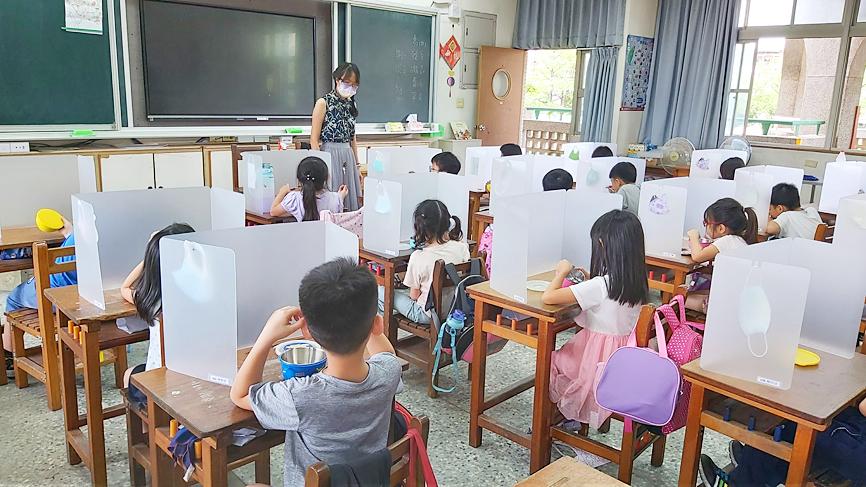Schools would open for the new semester on Sept. 1 as long as the nation’s COVID-19 alert remains at level 2 over the coming weeks, most local governments said yesterday.
Taipei Deputy Mayor Tsai Ping-kun (蔡炳坤) said that students would be required to wear masks, and must have dividers to separate them when eating.
No outdoor sports would be permitted, in line with the Central Epidemic Command Center’s (CECC) recommendations, he said.

Photo courtesy of the Tainan Bureau of Education
For music classes, teachers would only provide instruction and demonstrations, as students would not be permitted to remove their masks to perform, he added.
If a student is diagnosed with COVID-19, their class would be suspended, Tsai said of the city government’s tentatively planned measures to handle infections, adding that if two were infected, then the school would close.
If one-third of schools within a district are shut down due to COVID-19, all schools within the district would close, he added.
New Taipei City Education Department Commissioner Chang Ming-wen (張明文) said that schools in the city would be open under alert levels 1 and 2, adding that if the alert is raised to level 3, but there are no confirmed cases within a district, then schools in that district would remain open.
School would close for three days if there is one confirmed case reported, and 14 days if there are two COVID-19 cases, he said.
Taichung officials also said that students in the city would begin the new semester on Sept. 1, adding that the city has 93 percent vaccine coverage for its high-school and elementary-school teachers.
Tainan officials said that although they are in principle preparing to open schools on Sept. 1, they would adhere to the CECC’s guidelines for students at high-school level and below.
Additional reporting by Liu Wan-chunand Su Meng-chuan

The Grand Hotel Taipei on Saturday confirmed that its information system had been illegally accessed and expressed its deepest apologies for the concern it has caused its customers, adding that the issue is being investigated by the Ministry of Justice Investigation Bureau. The hotel said that on Tuesday last week, it had discovered an external illegal intrusion into its information system. An initial digital forensic investigation confirmed that parts of the system had been accessed, it said, adding that the possibility that some customer data were stolen and leaked could not be ruled out. The actual scope and content of the affected data

DO THEY BITE IT? Cats have better memories than people might think, but their motivation is based entirely around the chance of getting fed Cats can remember the identity of the people who fed them the day before, Taipei-based veterinarians said on Friday, debunking a popular myth that cats have a short memory. If a stray does not recognize the person who fed them the previous day, it is likely because they are not carrying food and the cat has no reason to recognize them, said Wu Chou Animal Hospital head Chen Chen-huan (陳震寰). “When cats come to a human bearing food, it is coming for the food, not the person,” he said. “The food is the key.” Since the cat’s attention is on the food, it

Taiwan must act to preempt potential Section 301 investigations as US President Donald Trump moves to a new tariff strategy, following a US Supreme Court ruling that voided tariff measures, an academic said yesterday. Countries running the largest trade surpluses with the US face a growing likelihood of Section 301 investigations, Chung-Hua Institution for Economic Research president Lien Hsien-ming (連賢明) said. Section 301 refers to a provision of the Trade Act of 1974 that allows Washington to impose retaliatory tariffs over perceived unfair trade practices, including the running of large trade surpluses. Because Taiwan has become the fourth-largest source of the US’ trade

People hold incense and pray with offerings in front of Taipei’s Kuanghwa Market yesterday. The fifth day of the Lunar New Year is traditionally about welcoming the God of Wealth, during which companies and shops set off firecrackers to celebrate their reopening and pray for good business in the new year.